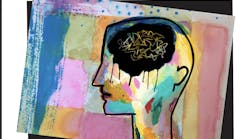Listen to the article on our podcast!
In 2024, the US Surgeon General pointed out his concern about the nation’s teenagers in a public address. Studies showed that mental health concerns among children and adolescents slowly rose, but recently they started growing exponentially. The Surgeon General reminded our nation that children are supposed to be free from worries with the chance to grow, learn, and find themselves, and not be bogged down by mental illness. Dr. Murthy stated that the COVID-19 pandemic had taken its toll on the mental health of teenagers.1 Still, other public concerns such as vaping, online bullying, and the digital era were also possible culprits as to why the US suddenly had unwell adolescents.1-5 Interestingly, the US was not the only country with struggling teens; other countries also reported a rise in depression and anxiety in this age group.1-2
Defining depression
Depression is a pervasive mental health disorder that can affect individuals of any age, ethnicity, or race. An estimated 20% of US teenagers suffered from at least one episode of depression in 2024. This condition, also known as depressional disorder, is characterized by persistent feelings of sadness or despair lasting for more than two weeks. Other types of depression include major depression, persistent depressive disorder, seasonal affective disorder, bipolar disorder, and depression with psychosis. These intense emotions can significantly alter a person’s behavior and overall sense of self. Depression encompasses a variety of symptoms and causes, leading to its classification into several types. Factors contributing to depression include situational, social, genetic, and neurotransmitter influences. Treatments for depression have traditionally included medication and therapy, with the first essential step being a formal diagnosis from a health-care professional.6-8
Anxiety
An estimated 3% of US teenagers have reported feeling episodes of anxiety at some point throughout their lives, with girls reporting feelings of anxiety more than boys. Unfortunately, sometimes when teenagers report how they feel, their symptoms can fall on deaf ears because professionals consider it to be a phase. Anxiety is defined as a persistent state of worry and must be diagnosed by a professional to receive treatment. There are several different types of anxiety disorders, including generalized anxiety, social anxiety disorder, panic disorder, and obsessive-compulsive disorder.7-9
Meds and their potential side effects
Depression and anxiety are treated with a variety of medications. When prescribing drugs to treat depression, typically selective serotonin reuptake inhibitors (SSRIs), atypical antidepressants, monoamine oxidase inhibitors (MAOIs), and tricyclic antidepressants are all recommended. Anxiety medications include selective serotonin reuptake inhibitors (SSRIs), serotonin and norepinephrine reuptake inhibitors (SNRIs), buspirone, hydroxyzine, propranolol, tricyclic antidepressants, and benzodiazepines. Doctors may also recommend therapy, exercise, sleep, dietary changes, and other holistic measures for teenagers to treat their mental health disorders.10
While all these medications are known to cause xerostomia, SSRIs are also known to induce bruxism in some patients.11 Xerostomia is a concern because it increases a patient’s risk for dental caries even if they decrease their sugar intake and establish excellent home care. A parafunctional habit like bruxism is also concerning because it can wear down tooth enamel, cause hypersensitivity, and break down existing dental materials. Research shows that when a person feels anxious or depressed, they may alter their diet to include high sugar and carbohydrates. In addition, their altered mood may make a person unable to care for their mouth.10-12
Dental professionals’ role
Dental professionals are not medically trained or licensed to diagnose or treat any form of mental illness. However, we are sworn health-care providers obligated to help protect our patients and guide them toward better health. Because of the oath we took at graduation, any dental provider should be concerned about the alarming rate of mental health disorders among adolescents and should recognize how it might affect their mouths. A dental professional should constantly update an adolescent’s medical history. If any SSRIs are listed, be sure to disclose the side effects that could affect the mouth, such as xerostomia and bruxism. In addition to updating a patient’s medical history, a dental hygienist should note any concerns they notice in their oral health status. If home-care patterns have slacked due to their mood, let the adolescent patient know how to improve their mouth slowly. Dental professionals can also make other healthy suggestions such as getting adequate sleep, exercising, and taking vitamins to see if that helps the patient’s mood.13-14
Editor's note: This article appeared in the April/May 2025 print edition of RDH magazine. Dental hygienists in North America are eligible for a complimentary print subscription. Sign up here.
References
- Murthy V. Protecting youth mental health. The U.S. Surgeon General Advisory. 2024. https://www.hhs.gov/sites/default/files/surgeon-general-youth-mental-health-advisory.pdf
- Haidt J. The Anxious Generation: How the Great Rewiring of Childhood Is Causing an Epidemic of Mental Illness. Penguin Press; 2024.
- Colliding crises: youth mental health and nicotine use. Truth Initiative. Sept. 19, 2021. https://truthinitiative.org/research-resources/emerging-tobacco-products/colliding-crises-youth-mental-health-and-nicotine-use
- Verlenden J, Fodeman A, Everett Jones S, et al. Mental health and suicide risk among high school students and protective factors—youth risk behavior survey, United States, 2023. CDC. 2024.
https://www.cdc.gov/mmwr/volumes/73/su/su7304a9.htm - The mental health impact of bullying on kids and teens. Mass General Brigham McLean.
https://www.mcleanhospital.org/essential/bullying-kids-teens - National Association of Mental Illness. 2025. https://www.nami.org/about-mental-illness/mental-health-conditions/depression/
- Geng C. What to know about teen depression and anxiety. MedicalNewsToday. July 27, 2021. https://www.medicalnewstoday.com/articles/teen-anxiety-and-depression
- Horowitz JM, Graf N. Most U.S. teens see anxiety and depression as a major problem among their peers. Pew Research Center. 2025. https://www.pewresearch.org/social-trends/2019/02/20/most-u-s-teens-see-anxiety-and-depression-as-a-major-problem-among-their-peers/
- Generalized anxiety disorder. The Center for Youth Mental Health. New York-Presbyterian. 2025. https://www.nyp.org/youthmentalhealth/anxiety-and-related-conditions/generalized-anxiety-disorder
- Pedersen T. What is the best anxiety medicine for a teenager? Healthline. April 19, 2023. https://www.healthline.com/health/anxiety/what-is-the-best-anxiety-medication-for-a-teenager
- Garrett AR, Hawley JS. SSRI-associated bruxism: a systematic review of published case reports. Neurol Clin Pract. 2018;8(2):135-141. doi:10.1212/CPJ.0000000000000433
- Hurley K. Teen depression: the pros and cons of medication. HealthCentral. June 8, 2022.
https://www.healthcentral.com/condition/depression/antidepressants-for-teens - Pieren J, Gadbury-Amyot C. Darby and Walsh Dental Hygiene Theory and Practice. 6th ed., Elsevier; 2025:chap 13.
- Huziar T. How to support your teen’s mental health. Today’s Parent. January 3, 2025. https://www.todaysparent.com/kids/tween-and-teen/how-to-support-your-teens-mental-health/
About the Author

Tracee S. Dahm, MS, RDH
Tracee S. Dahm, MS, BSDH, is an adjunct clinical instructor for the North Idaho College School of Dental Hygiene. She also works in private practice. Dahm has been published in dental journals, magazines, webinars, and textbooks, and featured on dental podcasts. She is a key opinion leader on cutting-edge innovations in the hygiene field. Her research interests include trends in dental hygiene, improving access to dental care for the underserved, and mental health. She can be reached at [email protected].


